Courses
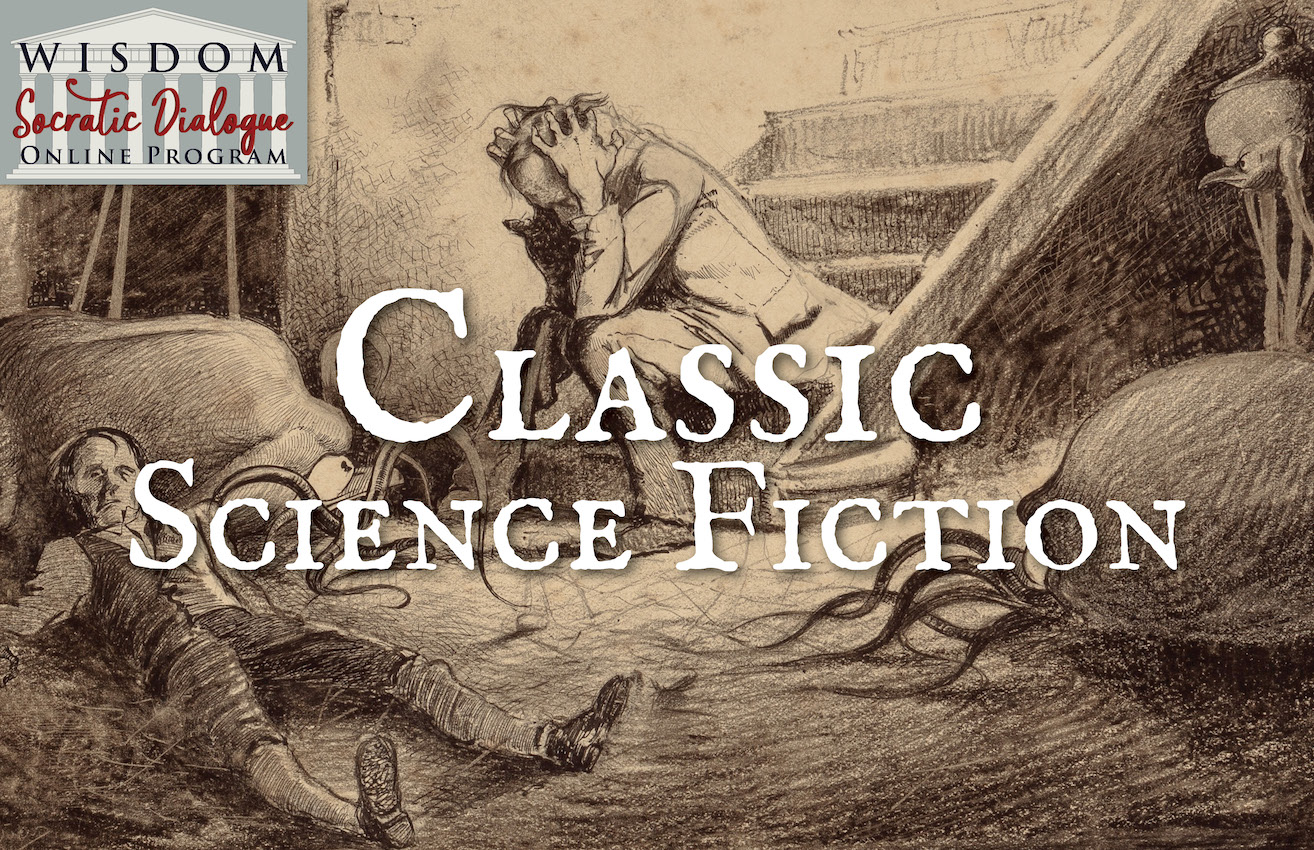
Intermediate Course (13 yrs and up), $185 – No Prerequisite
An overview of some of the thrilling tales which helped to provide the foundation for one of the most popular modern genres, Classic Science Fiction explores stories of fantastic futuristic feats and astonishingly ambitious adventures. We will discuss the true nature of heroism and bravery, as well as the ethics and philosophy of science itself in our unpacking of these gripping classics.
To Buy:
- I, Robot by Isaac Asimov
(This is a solitary volume, not a part of Asimov's "Robot Series". The title should just be "I, Robot". Here is an example available on Amazon.)
All other readings are provided in an online format below, but we recommend that hard copies be obtained for ease of reading.
Week 1: From the Earth to the Moon by Jules Verne, Ch.1 - 14
Week 2: From the Earth to the Moon, Ch.15 - 28
Week 3: Round the Moon by Jules Verne, Preliminary Chapter - Ch. 9
Week 4: Round the Moon, Ch.10 - 23
Week 5: The Time Machine by H.G. Wells, Ch.1 - 6
(Some editions might have this as an untitled chapter 4 – the reading is the same; the chapter should end with the line: “Very simple was my explanation, and plausible enough—as most wrong theories are!”)
Week 6: The Time Machine, Ch.7 - 16
Week 7: The War of the Worlds by H.G. Wells, Book 1 (all)
Week 8: The War of the Worlds, Book 2 (all)
Week 9: The Lost World by Sir Arthur Conan Doyle, Ch. 1 - 9
Week 10: The Lost World, Ch. 10 - 16
Week 11: Out of the Silent Planet by C.S. Lewis, Ch. 1 - 13
Week 12: Out of the Silent Planet, Ch. 14 - Postscript
Week 13: I, Robot by Isaac Asimov, Introduction - Ch. 5
(This is a solitary volume, not a part of Asimov's "Robot Series". The title should just be "I, Robot". Here is an example available on Amazon.)
Week 14: I, Robot, Ch. 6 - 9

14 yrs and up, $175, 14 week course - Prerequisite: Foundational Great Books
This course will immerse students in an examination of our wider cosmos as they come to understand the purpose of studying Astronomy and how it points to a great symmetry and design in the cycle of the heavens. Through the writing and mathematical hypothesis of the ancient astronomers, students will investigate the movements of astronomical bodies and how their early understanding progressed to our knowledge of the heavens today.
All readings and course material are provided to students in an online format below.
Potential Projects:
- Observing the setting of the Sun, time based upon a point of reference location.
- The movement of the stars across the sky, through choosing one star close to the horizon and noting the time it sets.
- Noting the phases of the moon throughout the month.
- Observations of the planets either hands on, or through of the use of Stellarium (software program)
Reading List:
(page numbers for PDFs follow the PDF numbering, not the original document page numbers)
Week 1:
- The Almagest by Ptolemy: Book 1, Chapters 1–2 (pg. 35-37) - Preface, On the Order of the Theorems
- Introductory Astronomy by Dr. Michael Augros: Day 1, Exercises 1-7 (pg. 1-5)
Week 2:
- Introductory Astronomy: Day 1, Phenomena related to Exercises 1-7 (pg. 5-8)
Week 3:
- The Almagest: Book 1, Chapters 3–4 (pg. 38-41) - That the Heavens Move Spherically, That the Earth Taken as a Whole Is Sensibly Spherical
- Introductory Astronomy: Day 2 (pg. 9-15)
Week 4:
- The Almagest: Book 1, Chapter 5 (pg. 50-51) - That the Earth is in the Middle of the Heavens
- Introductory Astronomy: Day 3 (pg. 16-22)
Week 5:
- The Almagest: Book 1, Chapters 6–7 (pg. 52-54) - That the Earth has the Ratio of a Point to the Heavens, That the Earth Does Not in Any Way Move Locally
- Introductory Astronomy: Day 4 (pg. 23-30)
Week 6:
- The Almagest: Book 1, Chapter 8 (pg. 54-56) - The Two Motions of the Heavens
- Introductory Astronomy: Day 5 (pg. 31-38)
Week 7:
- The Almagest: Book 3, Chapter 3 (pg. 58-70) - Hypotheses as to Uniform Circular Motion
- Introductory Astronomy: Day 17 (pg. 117-123)
Week 8:
- The Almagest: Book 9, Chapter 1-2 (pg. 71-75) - On the Order of the Spheres of the Sun, Moon, and Five Planets
- Perry Translation of and Commentary on Ptolemy’s Almagest: Preliminaries to Book 9
Week 9:
- On the Revolutions of the Heavenly Spheres by Nicolaus Copernicus, Forward “To The Reader,” Preface and Dedication to the Pope Paul III
- Introductory Astronomy: Day 27 (pg. 201-206)
Week 10:
- On the Revolutions of the Heavenly Spheres, Book 1, Introduction, Chapters 1-2 & 4-6 (The World is Spherical; The Earth is Spherical Too; The Movement of the Heavenly Bodies; Does the Earth Have a Circular Movement? And of its Place; On the Immensity of the Heavens in Relation to the Magnitude of the Earth)
- Introductory Astronomy: Day 28 (pg. 207-213)
Week 11:
- On the Revolutions of the Heavenly Spheres, Book 1, Chapters 7-8 (Why the Ancients Thought The Earth was At Rest at the Middle of the World; Answer to the Aforesaid Reasons and Their Inadequacy)
- Introductory Astronomy: Day 29 (pg. 214-220)
Week 12:
- On the Revolutions of the Heavenly Spheres, Book 1, Chapters 9-10 (Whether Many Movements Can be Attributed to the Earth, and Concerning the Center of the World; On the Order of the Heavenly Orbital Circles)
- Introductory Astronomy: Day 30 (pg. 221-227)
Week 13:
- On the Revolutions of the Heavenly Spheres, Book 1, Chapter 11 (A Demonstration of the Threefold Movement of the Earth)
- Introductory Astronomy: Day 31 (pg. 228-232)
Week 14: Lecture: What has Happened in Astronomy Since Copernicus? A Brief Overview of Kepler, Newton and Einstein

14 yrs and up, $175, 14 week course – Prerequisite: Foundational Great Books
In this course, students will learn and appreciate the ancient approach of the study of the natural world in the context of living things. This course will discuss the methods and fundamental questions of classic natural science. How do we come to know about the natural world? What are the principles of nature? What kind of knowing is instinct? What does it mean to be “alive”?
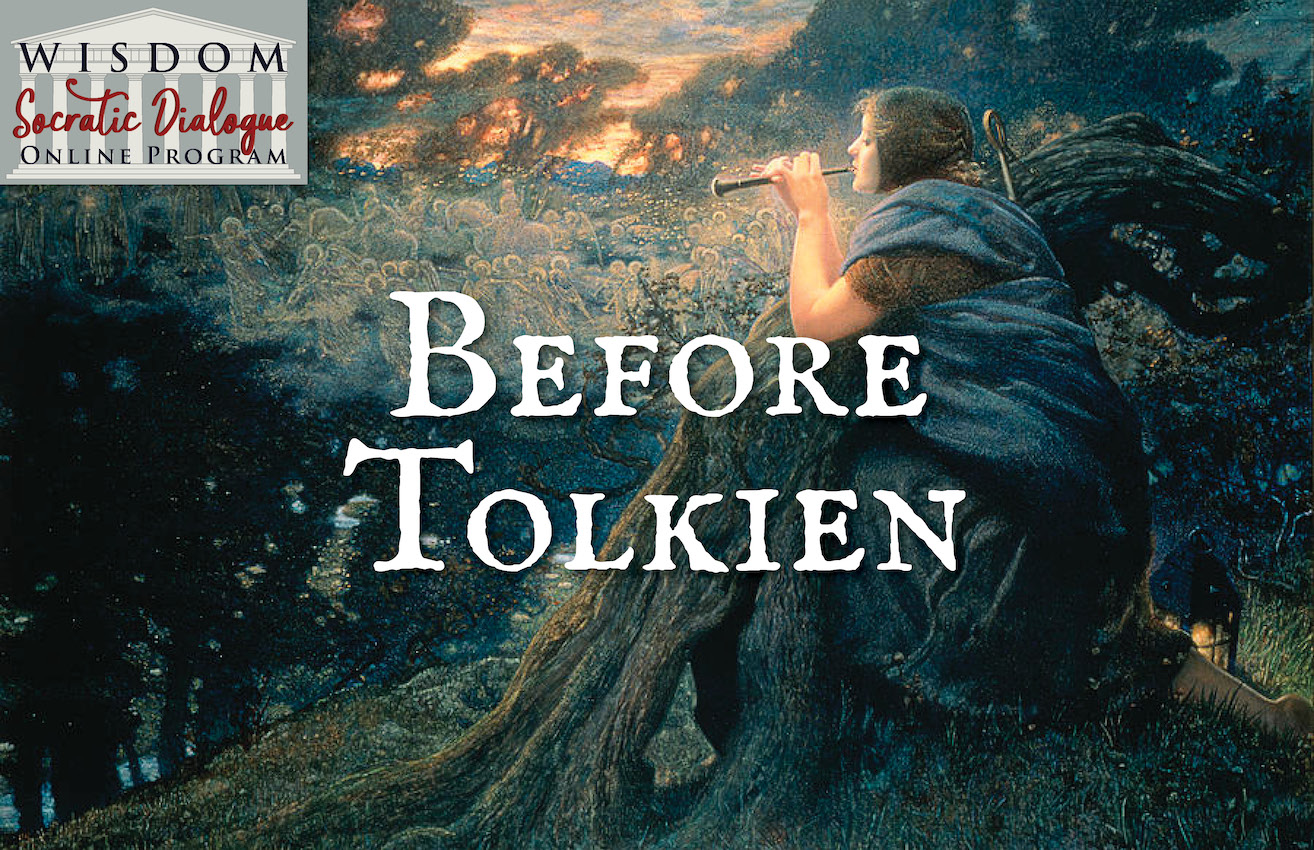
14 yrs and up, $185 - Prerequisite: Must have read The Hobbit and The Lord of the Rings Trilogy
Sojourn through the ages, reading Greek and Norse mythology and Christian tales. Each class will take time to discuss Tolkien’s works in light of the bigger, weekly discussions. The reading list includes titles that influenced J.R.R. Tolkien and his writings, and students can begin to glimpse the great wealth of inspiration that inspired the timeless characters of Tolkien's work. While some readings may be challenging, they serve as a great reminder of the early legends and stories that continue to shape our culture and persistently fascinate the imagination.

13 yrs and up, $175 – No Prerequisite
By utilizing the Socratic Method of discussion, students will uncover timeless truths embedded in Nicholas Nickleby.Hot-tempered, daring, and wonderstruck Nicholas Nickleby breaks the law to save his friend Smike from his tyrannical, one-eyed master. Only nineteen years old, the two of them find themselves on the run, seeking their fortune wherever they can find it. Hilarity strikes as Nicholas finds himself in crazy situations only Dickens could dream up, but he must also use his wits and his fists against an array of villains who are determined to destroy him. Drama, humour, true love, tragedy, and surprises abound in a young Charles Dickens’ masterpiece.

12 yrs and up - $175.00 - 14 week course – No Prerequisite
Robert Schumann, pianist and composter, said, "To send light into the darkness of men's hearts - such is the duty of the artist." In this course, students will listen to the works of the masters, spanning the centuries, and discover the light that music sheds in the understanding of truth. Through the use of audio and visual activities and exercises, as well as reading, the students will experience the historical processes by which musical styles grow, develop, mature, and decline.
This course covers the music periods of Romantic (1860-1920) through to the modern era.
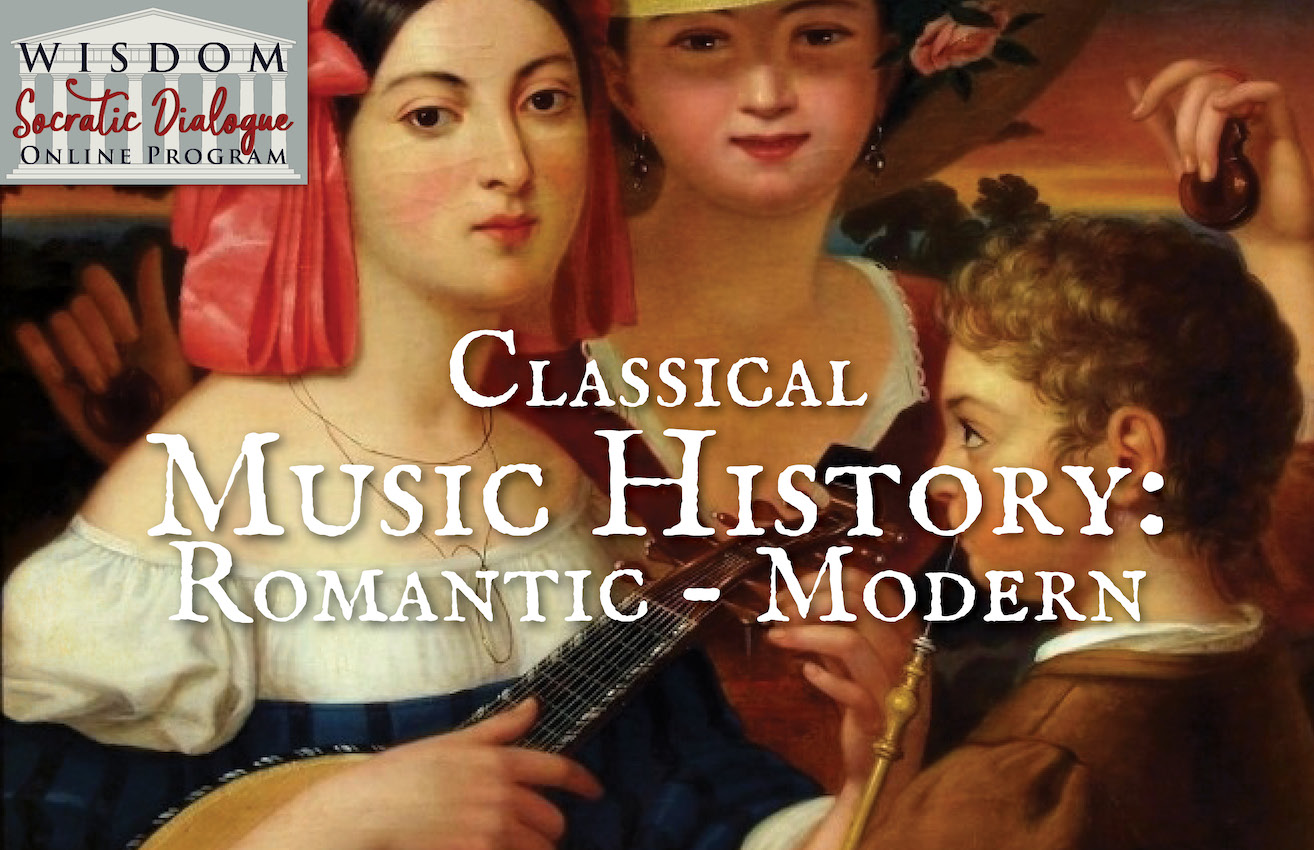
Intermediate Course (12 yrs and up), $185, 14 week course – No Prerequisite
It has been said by many that "Music is the universal language of mankind"; music tells a story through the use of sound to convey emotion and depict imagery throughout the ages. In this course, students will listen to the works of the masters, spanning the centuries, and discover the light that music sheds in the understanding of truth. They will engage in listening activities, readings, and class discussion to experience the historical processes by which musical styles grow, develop, mature, and decline. This process will help them to make connections between historical eras, art and music to understand the role music plays in the bigger picture of the elements that have shaped our cultures and societies.
This course covers the music periods of medieval music (1150-1400) through to the late Romantic era (1860-1920).
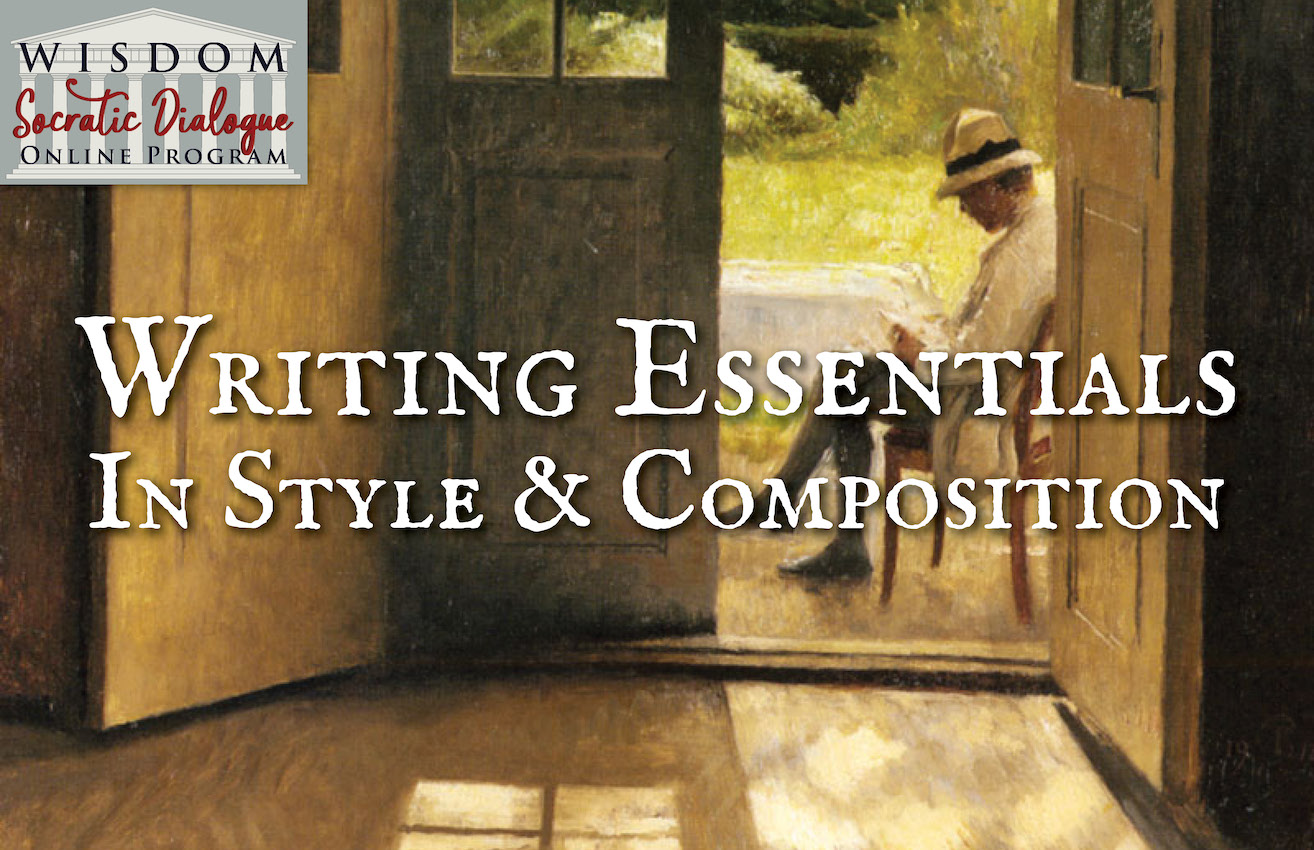
Senior Course (14 yrs and up), $325, 14 week course – Prerequisite: Intro to High School Writing or Mastering the Essay
This course is a sequel to the prerequisite courses. Like Intro to High School Writing and Mastering the Essay, it is a practical course designed to help the students improve their writing skills by expanding their writing experience through a diverse collection of styles. Students will delve deeper into specific writing genres, such as critique, allegory, persuasion, and tragedy, and continue to hone their writing abilities in preparation for any post-secondary choices. In this high school level writing course, the writing study will be enriched by pertinent selections for discussion from classic literature. This course includes a weekly private tutorial time in addition to the weekly assignment.
Extra private 30 minute tutorials are available upon request. (Cost: $25/tutorial)
Please contact Nicole Noster to receive more information or to book additional tutorials: nicole@wisdomhomeschooling.com
All lessons and readings are provided to students in an online format below.
Week 1: Descriptive Writing
Week 2: Critiquing, Evaluating, & Judging
Week 3: Metaphor & Simile
Week 4: Verse
Week 5: Allegory, Parable & Fable
Week 6: Logical Argument
Week 7: Persuasive Writing: Logos
Week 8: Persuasive Writing: Pathos
Week 9: Persuasive Writing: Ethos
Week 10: Dialogue
Week 11: Tragedy
Week 13: Film Script: Part I
Week 14: Film Script: Part II
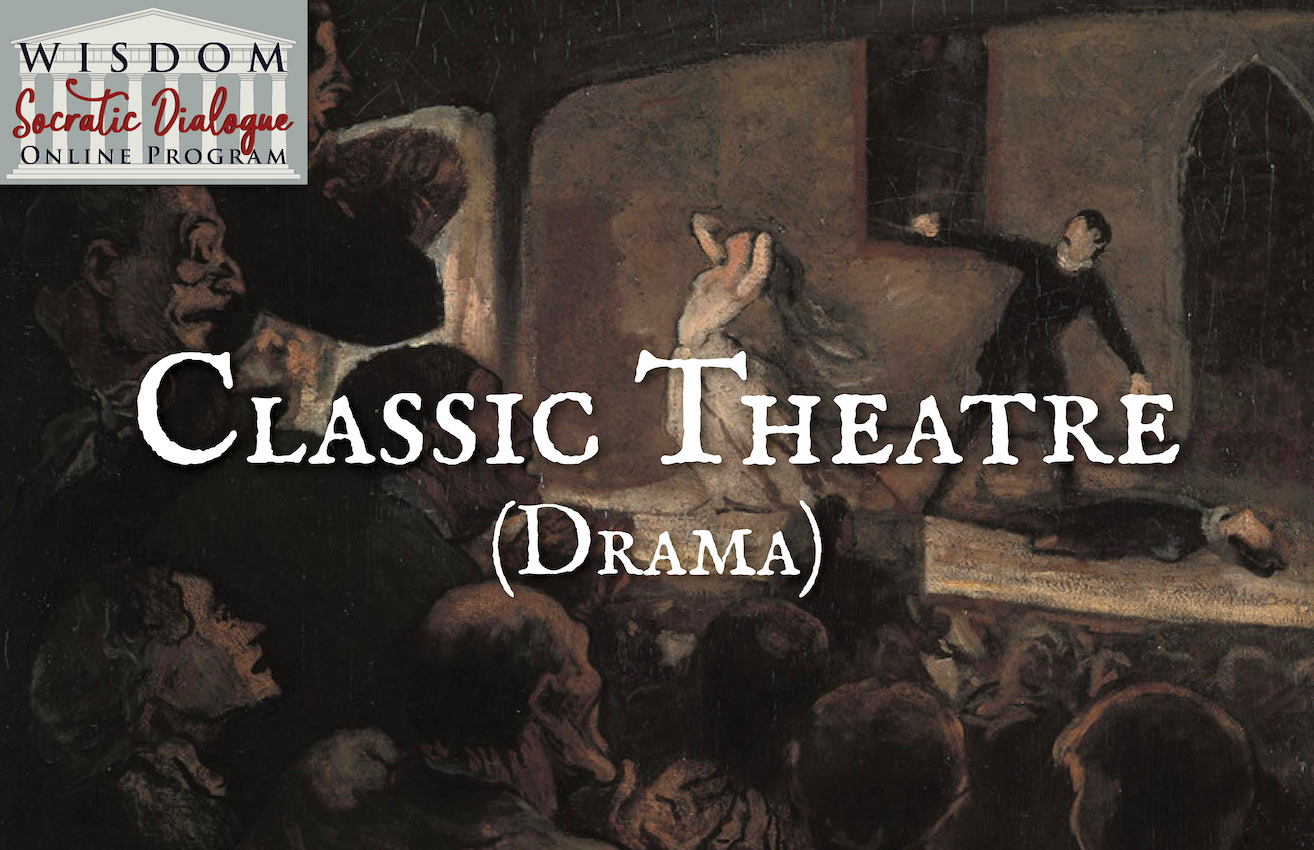
14 yrs and up, $195, 14 week course – Prerequisite: One Intermediate Level course
A girl secretly helps an enemy soldier to escape from the soldiers of her own country – and finds herself bound to a dangerous game of secrecy. A Russian village is convinced that a spy is among them – unaware that he is only a bored young man with a tremendous imagination who loves to see what he can get away with. A king and a humble gondolier were mixed up at birth – now that they are of age, not even they know which should inherit the crown! Lights dim, the curtain rises, and the audience is swept away by side-aching laughter, fantastic thrills, and deeper questions that stay with us. Students read through the scripts of these timeless plays, and get a chance both to discuss them Socratically and to perform scenes from them in class, readers’ theatre style. From Shaw to Shakespeare to Sophocles, come unleash your flair for the dramatic, and dive into some of the world’s greatest works of theatre.
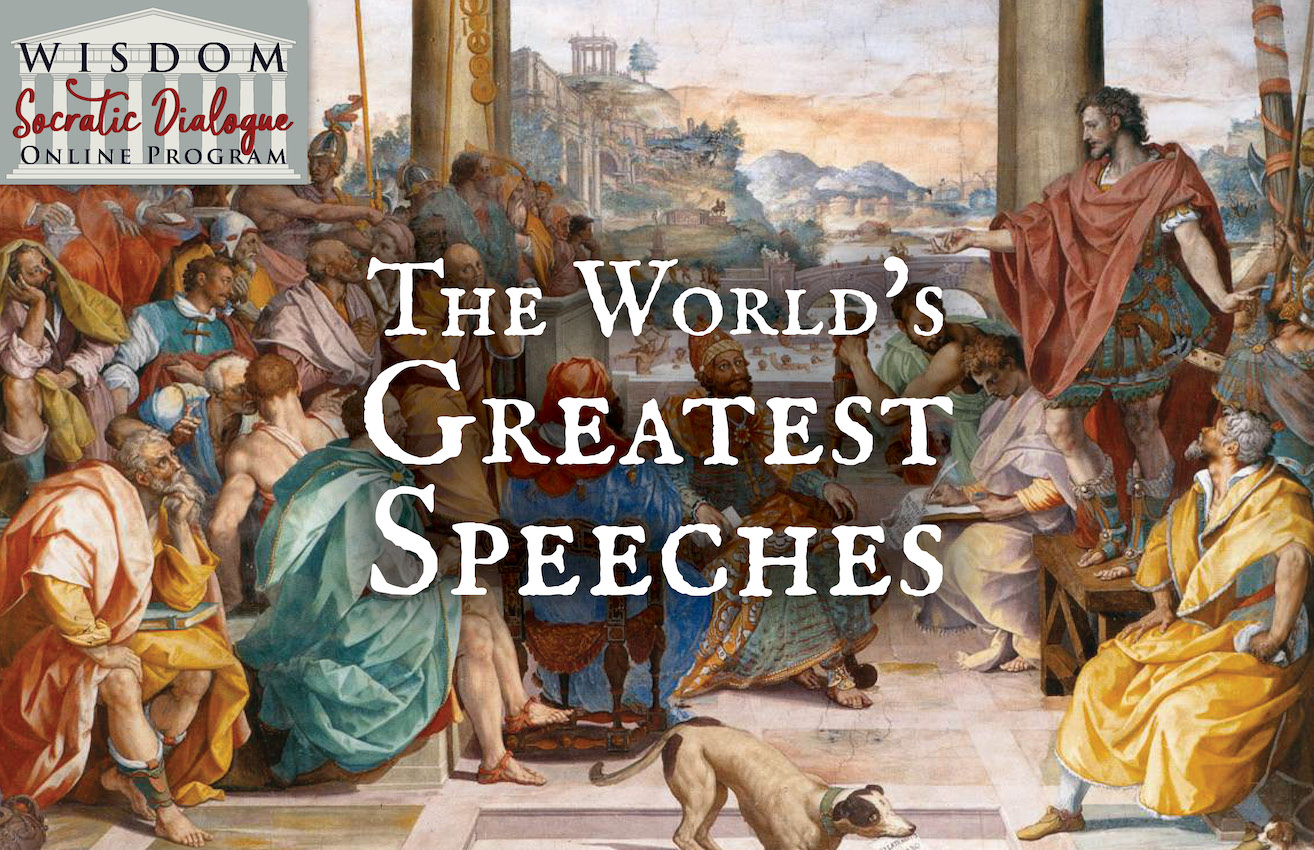
Senior Course (14 yrs and up), $185, 14 week course – Prerequisite: One Intermediate Level course
In the Rhetoric, Aristotle states that, “It is absurd to hold that a man should be ashamed of an inability to defend himself with his limbs, but not ashamed of an inability to defend himself with speech and reason; for the use of rational speech is more distinctive of a human being than the use of his limbs.” There is no doubt that Rhetoric has been used in the World’s greatest speeches in order to persuade man to fight and believe in a cause. This class will explore many of the world’s greatest speeches and judge them through the light of Aristotle’s Rhetoric and through their own merits. What makes a speech great, even once the time for action has passed? How does one know when Rhetoric is being used for a good, or bad, cause?
The Speeches studied in the course reach from Ancient Greece, to Christ’s Sermon on the Mount, and the 40th Anniversary of D-Day. It will cover speeches from the World Wars, the Abolition of the Slave trade, as well as Nobel Peace Prize Acceptance Speeches.
